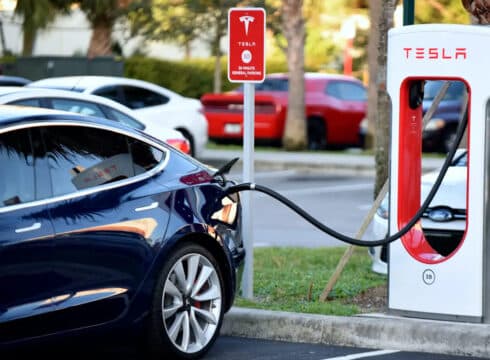The government will not make separate policies for a single company but Tesla is free to apply for incentives under the Centre’s PLI scheme
Panasonic, which is the biggest supplier of batteries to Tesla, met government officials and expressed its intention to make batteries in India
The development comes at a time when Tesla has changed its earlier position on India and is now looking at setting up a manufacturing plant in the country
Inc42 Daily Brief
Stay Ahead With Daily News & Analysis on India’s Tech & Startup Economy
The Indian government does not intend to come out with any separate scheme to incentivise electric car manufacturer Tesla to set up a manufacturing plant in India, as per a government official.
“We have told Tesla that the policies, which are already there for all, they can also apply under that PLI. They are welcome. Generally, the policy will be the same for all. For a single company, the government may not like to make separate policies. So far, there is no plan to give special treatment,” news agency PTI quoted a government official as saying.
The official was referring to the government’s production linked incentive (PLI) schemes for automobile and auto components and advanced chemistry cell (ACC) battery storage. While the outlay for automobile and auto components is INR 26,058 Cr, that for ACC battery storage is INR 18,100 Cr.
The official was also cited as saying that Panasonic, which is the biggest supplier of batteries to Tesla, met government officials and expressed its intention to make batteries in India. The company was asked to apply for the PLI scheme for ACC.
The latest development comes at a time when the Elon Musk-led company has renewed its focus on India and is looking to set up manufacturing plants in India.
Last year, Musk criticised the Indian government over the high import duties on electric vehicles and called for a cut in taxes. However, the government refused the demand, following which the US-based company said it would not manufacture in any country where it was not allowed to sell and service cars first.
However, in what seems to be a move to reduce the reliance on China amidst growing tensions between Washington and Beijing, representatives of Tesla visited India and held meetings with officials from various ministries, including the Commerce and Industry Ministry.
Tesla CEO Musk also met Prime Minister Narendra Modi in New York last month. After the meeting, Musk expressed his intention to visit India in 2024. “I am confident that Tesla will be in India, and we will do so as soon as humanly possible,” he said.
At present, imported cars that are fully built units (CBUs) attract customs duty ranging from 60 per cent to 100 percent, depending on the engine size and cost, insurance, and freight (CIF) value, being less or above USD 40,000.
Tesla’s CEO, Elon Musk, met with Prime Minister Narendra Modi in New York last month. After the meeting, Musk expressed his intention to visit India in 2024, asserting, “I am confident that Tesla will be in India, and we will do so as soon as humanly possible.” He also hinted at the likelihood of a significant investment and a strong relationship with India.
India, as the world’s third-largest energy consumer, is positioning itself as an attractive destination for investment by US companies, leveraging the growing tensions between Beijing and Washington.
With the government’s stance on providing incentives through existing schemes, Tesla now has an opportunity to explore the Indian market further and contribute to the country’s growing electric vehicle industry. As the nation makes strides towards sustainable mobility, collaborations with global players like Tesla could foster technological advancements and boost the adoption of electric vehicles in the country.
{{#name}}{{name}}{{/name}}{{^name}}-{{/name}}
{{#description}}{{description}}...{{/description}}{{^description}}-{{/description}}
Note: We at Inc42 take our ethics very seriously. More information about it can be found here.


